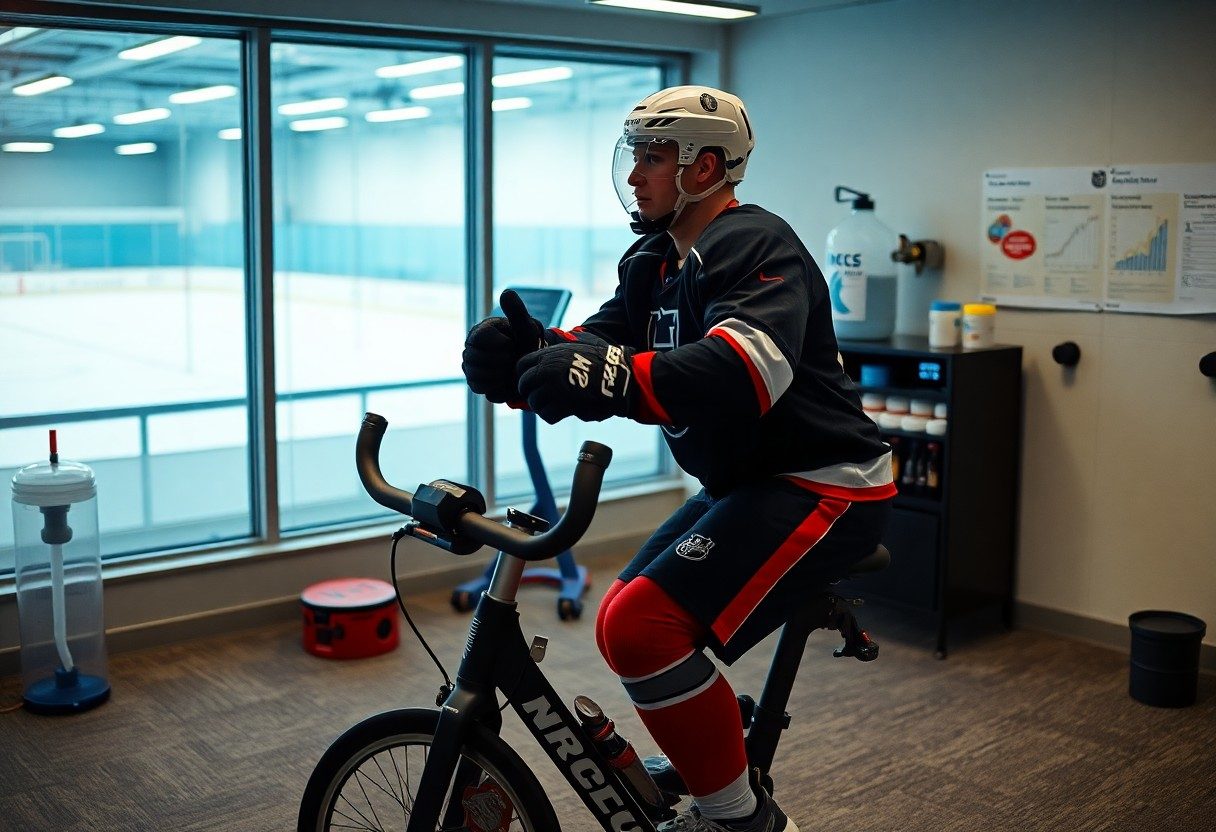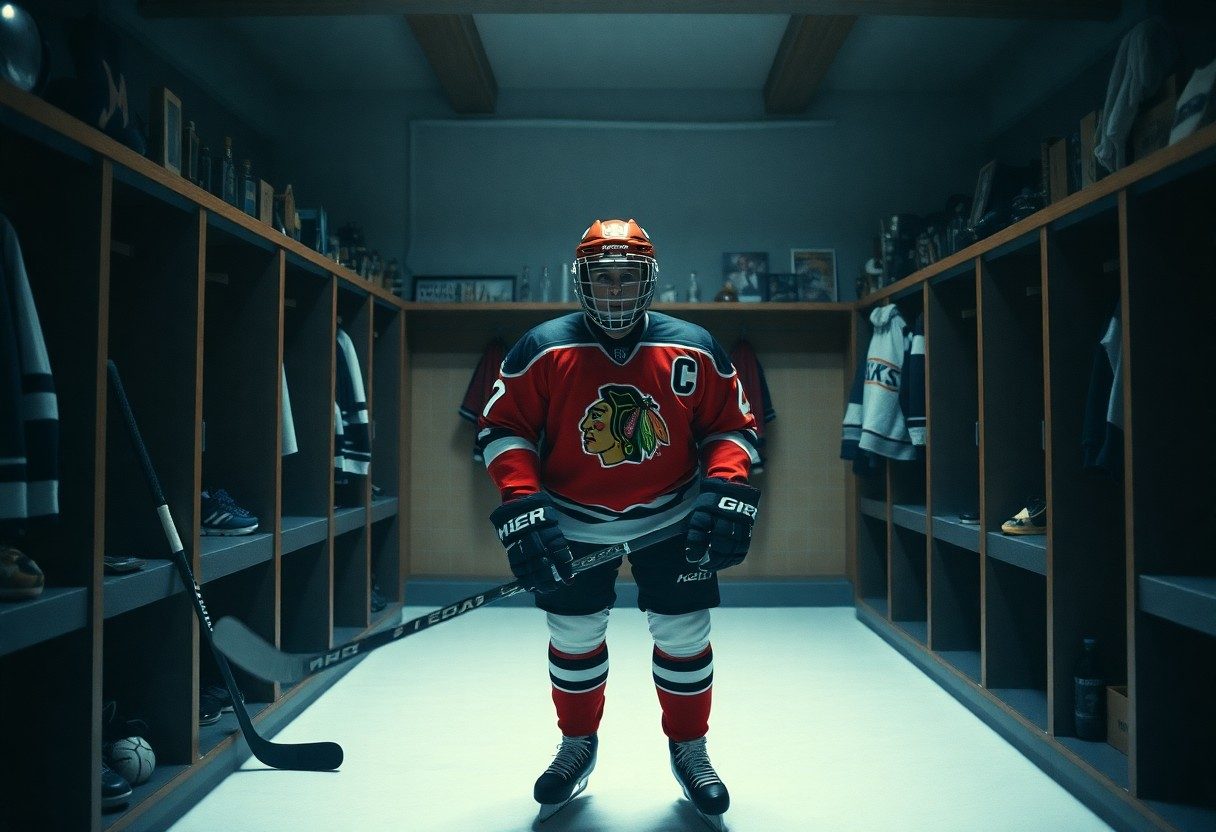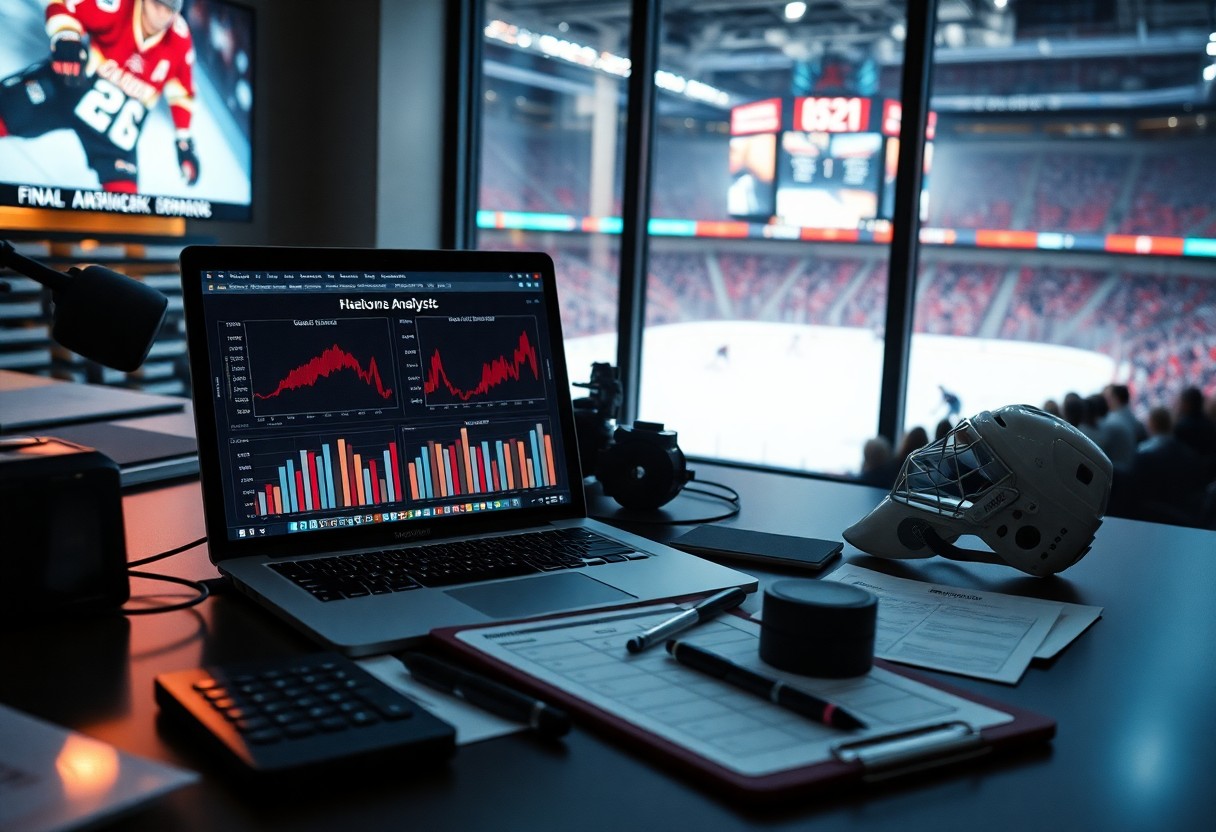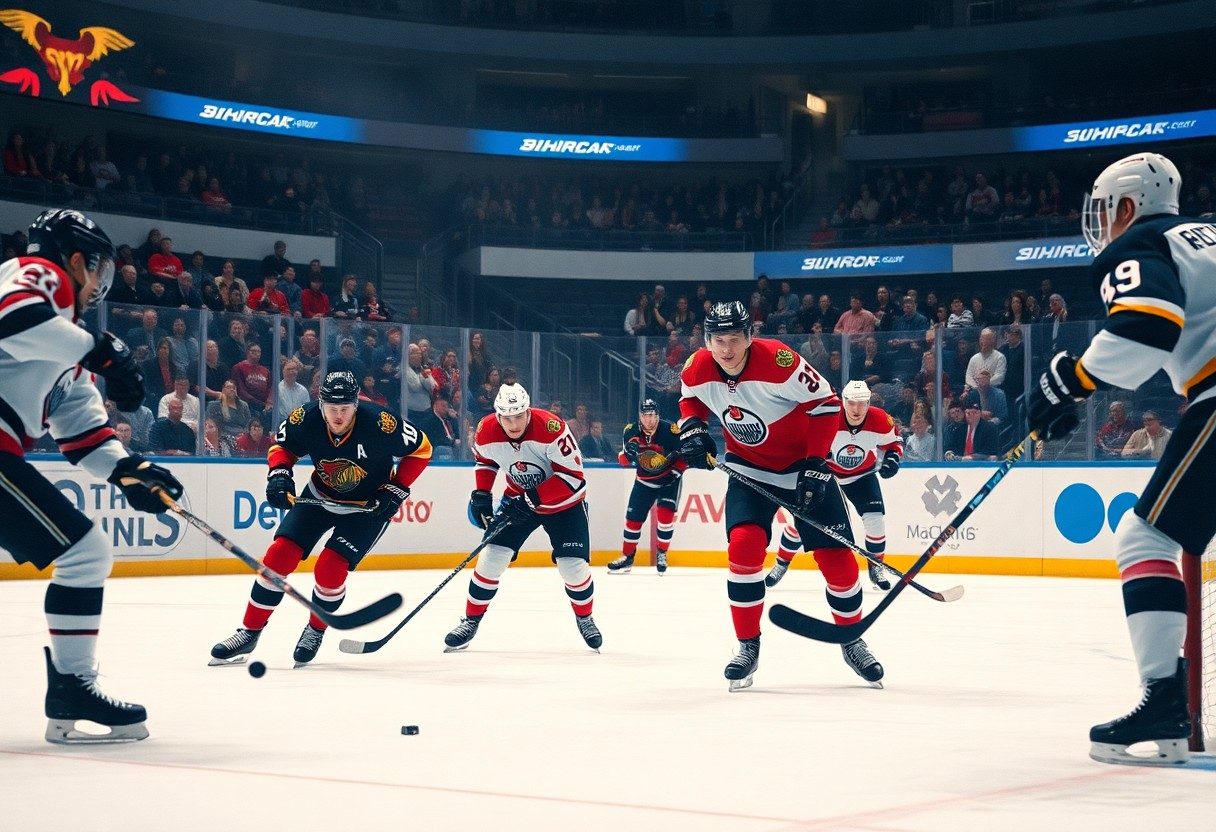Most NHL players endure a grueling schedule that demands not only physical endurance but also mental resilience. To achieve peak performance throughout the long season, athletes employ advanced training regimens, strict nutrition plans, and effective recovery techniques. This comprehensive approach is necessary for preventing injuries and combating fatigue, ensuring players are at their best when it counts. By understanding these methods, fans and aspiring athletes can gain insight into the dedication required to excel at this elite level of competition.
Understanding Peak Performance
Understanding the nuances of peak performance in hockey is crucial for players and coaching staff alike. It encompasses not just physical conditioning, but also mental readiness, nutrition, and strategic gameplay. To sustain a high level of performance across an arduous season, athletes must find a balance that allows them to thrive under pressure while mitigating the risks of injury and fatigue.
Definition of Peak Performance
Peak performance refers to the optimal state in which an athlete exhibits maximum efficiency, skill execution, and emotional resilience during games. This state allows players to utilize their physical attributes, including speed, agility, and strength, while also maintaining sharp cognitive functions for quick decision-making.
Importance in the NHL
In the NHL, peak performance directly influences a player’s effectiveness on the ice and a team’s overall success. Players who consistently perform at their best contribute to better strategies, enhanced teamwork, and increased chances of victory. Historical data shows that teams with players maintaining peak condition often outperform their competitors, showcasing the direct link between physical preparedness and on-ice achievement.
The advantages of peak performance extend beyond individual contributions; they shape the overall dynamics of team play. For instance, successful teams often feature players who can quickly adapt during high-pressure situations, demonstrating both mental fortitude and physical readiness. In the 2020-2021 season, the Tampa Bay Lightning utilized a well-structured approach to conditioning and recovery that propelled them to a successful championship run, highlighting how sustained peak performance can lead to tangible results in the postseason. Consequently, NHL teams invest heavily in sports science and wellness programs to ensure every player can reach and maintain their best performance throughout the season.
Factors Influencing Performance
Several factors affect the performance of NHL players throughout the long season. The intersection of physical conditioning, dietary habits, and mental resilience plays a pivotal role in sustaining peak performance. Key elements include:
- Training regimens
- Nutrition plans
- Rest and recovery
- Injury management
- Mental fortitude
Thou can see how all these factors intertwine to create a comprehensive approach to maintaining high-level performance in the NHL.
Physical Conditioning
Physical conditioning is vital for NHL players, as they demand exceptional stamina and strength during long games. With a focus on weight training, cardiovascular workouts, and agility drills, players tailor their fitness routines to meet the specific demands of the sport. For instance, implementing high-intensity interval training enhances anaerobic capacity, enabling athletes to sustain energy bursts vital for quick plays. Additionally, injury prevention measures, such as flexibility training and proper warm-ups, ensure athletes remain in top shape throughout the season.
Mental Resilience
Mental resilience is just as important as physical training in the NHL. Players face constant pressure from their performance expectations and the need to recover quickly from setbacks. Techniques such as visualization, mindfulness meditation, and cognitive training are increasingly utilized to enhance focus and emotional control. The ability to manage stress and maintain a positive mindset creates a competitive edge during critical moments of intense matches.
Building mental resilience involves consistent practice; for example, many players partake in sports psychology sessions to develop strategies that reinforce their confidence and assist them in coping with pressure. Moreover, sharing experiences with teammates fosters a support system that can elevate a player’s mental fortitude. The balance of routine assessments and mental skill development significantly impacts their performance during the relentless NHL season.
Types of Training Regimens
- Strength training for muscle balance
- Cardiovascular conditioning to enhance oxygen flow
- Skill drills for precision and technique
- Flexibility exercises to prevent injuries
- Recovery sessions for muscle repair
This approach allows players to maintain their strength and agility throughout the season.
| Training Type | Description |
| Strength Training | Focuses on muscle growth and joint stability. |
| Cardiovascular Conditioning | Builds endurance and increases stamina. |
| Skill Drills | Enhances puck handling and shooting accuracy. |
| Flexibility Exercises | Improves mobility and reduces injury chances. |
| Recovery Sessions | Essential for muscle healing and energy recovery. |
Strength and Conditioning
Strength and conditioning programs are designed to develop the muscular strength necessary for rigorous ice hockey performance. These programs often include weightlifting routines that target core, legs, and upper body, ensuring that players can withstand the physical demands of the game. With dedicated focus on muscle endurance, players can perform at peak levels even in the later stages of the season.
Endurance and Skill Development
Endurance and skill development are interlinked, as both are vital for success on the ice. Endurance training enables players to sustain high intensity over prolonged periods, while skill development hones techniques and tactical awareness. Drills incorporate repetitive movements that improve reaction times, decision-making, and overall performance. This combination ensures that players maintain agility and finesse when fatigue sets in during crucial game moments.
Effective endurance and skill development regimes typically involve a mix of high-performance drills focusing on skating, shooting, and passing. For instance, teams use interval training to simulate game conditions, enhancing both aerobic and anaerobic capacities. On-ice skill sessions include precision passing under pressure, facilitating a sharp focus even during high-stress situations. Regular evaluations help track progress, allowing players to refine their techniques continually. This comprehensive approach prepares players for the demands of an NHL season effectively.
Nutritional Strategies
NHL players rely on targeted nutritional strategies to optimize performance and recovery during the grueling season. These athletes prioritize balanced diets rich in macronutrients, which play significant roles in energy production and muscle repair. Teams often employ nutritionists who tailor meal plans to individual needs, ensuring players have the right balance of proteins, carbohydrates, and fats for sustaining energy levels and promoting recovery.
Macronutrient Balance
Adequate macronutrient balance is vital for hockey players, as they require a tailored ratio of proteins, carbohydrates, and fats to support intense workouts and in-game performance. For example, while proteins assist in muscle recovery and repair, carbohydrates offer the energy source needed for high-intensity bursts on the ice. Typically, players might aim for a ratio of 40-60% carbohydrates, 25-35% fats, and 15-25% proteins depending on their training cycle.
Hydration Techniques
Hydration techniques are integral to maintaining peak performance in NHL players. Consistent fluid intake before, during, and after games is necessary to prevent dehydration, which can impair endurance and cognitive function. Players often drink electrolyte-rich beverages to replenish lost salts, as these are key for muscle function and recovery.
To enhance hydration, many teams implement strategies such as personalized fluid monitoring and education on recognizing early signs of dehydration. Players are encouraged to hydrate consistently, utilizing clear guidelines for pre-game hydration (aiming for at least 16-20 ounces of fluid a few hours before a game) and intra-game strategies, such as sipping on sports drinks every 10-15 minutes. Post-game, replenishment with both fluids and electrolytes helps mitigate losses incurred during the game and supports quick recovery, ultimately enhancing performance consistency throughout the season.
Tips for Sustained Performance
- Nutrition for energy levels
- Consistent Training for skill refinement
- Hydration to prevent fatigue
- Rest to maintain physical health
- Mental strength for focus and resilience
This comprehensive approach ensures players can sustain their performance throughout the lengthy season.
Rest and Recovery Practices
Effective rest and recovery practices are necessary for maintaining peak performance. Players often integrate methods like active recovery, which includes low-intensity exercises to aid muscle repair. Regular use of ice baths and massage therapy helps reduce muscle soreness. Sleep is prioritized, with athletes aiming for 8-10 hours per night to support not just their physical health but also their mental acuity. This strategy allows players to rebound quickly from the rigors of competition.
Mental Health and Focus
The mental aspect of performance cannot be overlooked. NHL players employ various techniques to enhance their focus and maintain mental health. Many work with sports psychologists to develop mental resilience strategies. Mindfulness and visualization techniques help players stay present and overcome pressure during high-stakes moments.
Regular mental conditioning is practiced, with players engaging in routines that promote psychological well-being. Activities like meditation, journaling, or engaging in hobbies outside the rink contribute to a balanced mindset. Emphasis is placed on understanding that mental fatigue can be as taxing as physical fatigue; thus, prioritizing mental health is integral for peak performance, ultimately influencing on-ice efficiency. This holistic approach fosters not just athlete longevity, but also sports enjoyment.
Pros and Cons of Various Approaches
| Pros | Cons |
|---|---|
| Enhanced strength and endurance | Increased risk of injury |
| Improved skill proficiency | Potential for mental burnout |
| Better game performance | Time-consuming |
| Develops resilience | May lead to overtraining syndrome |
| Boosts confidence | Disruption of recovery cycles |
| Structured routine aids discipline | Expense of specialized facilities |
| Increased adaptability on ice | Potential isolation from teammates |
| Focus on physical health | Neglect of mental wellbeing |
| Long-term gains | May not suit all player types |
| Access to expert coaching | Dependence on training programs |
Advantages of Rigorous Training
Rigorous training provides athletes with the opportunity to develop robust physical attributes, such as strength, speed, and stamina. This elevated fitness level translates directly onto the ice, allowing players to execute complex maneuvers and maintain peak performance throughout the lengthy season. With systematic practice, players sharpen their skills and enhance team dynamics, contributing to cohesive gameplay and better strategies, important for competing at the highest level.
Potential Drawbacks of Overtraining
Overtraining can lead to a host of issues that impede an athlete’s ability to perform optimally. Symptoms such as chronic fatigue, decreased performance, and increased injury risk often arise due to insufficient recovery time. Moreover, the mental toll manifests in heightened stress levels and reduced motivation, potentially jeopardizing a player’s overall enjoyment of the sport.
Overtraining may significantly diminish an athlete’s long-term potential. For example, players may experience prolonged discomfort or injuries, leading to missed games or even seasons. An NCAA study showed that around 60% of college athletes reported feeling mentally drained, directly correlating with their performance decline. Additionally, the competitive nature of professional sports can exacerbate these issues as athletes push through pain rather than prioritizing adequate recovery, creating a cycle that can ultimately hinder their careers.
Final Words
To wrap up, NHL players sustain peak performance throughout a demanding season by prioritizing a combination of rigorous training, proper nutrition, mental resilience, and injury management. They engage in specialized workouts tailored to enhance strength, agility, and endurance, while carefully monitoring their diet to support recovery and energy levels. Additionally, mental conditioning plays a significant role in maintaining focus and motivation. By adhering to these principles, players maximize their potential and longevity in the sport, ensuring they remain competitive at the highest level throughout the grueling season.
FAQ
Q: How do NHL players manage their physical conditioning throughout the season?
A: NHL players maintain their physical conditioning by following a strict training regimen that includes strength training, cardiovascular workouts, and flexibility exercises. They work with trainers to develop personalized programs that adapt to their schedule and game demands, ensuring they stay in top shape despite the wear and tear of a long season.
Q: What role does nutrition play in an NHL player’s performance?
A: Nutrition is vital for NHL players as it supports their energy levels and aids in recovery. Players typically follow tailored meal plans rich in proteins, carbohydrates, and healthy fats. They also prioritize hydration and may use supplements to ensure they meet their nutritional needs, which is vital for sustaining performance over a lengthy season.
Q: How do NHL players cope with mental fatigue and maintain focus during the season?
A: NHL players cope with mental fatigue by employing strategies such as mindfulness, relaxation techniques, and mental conditioning coaches. Regular discussions with sports psychologists help players focus on their game and manage the pressures associated with a long season. Balancing work and personal life also contributes to maintaining mental well-being.













